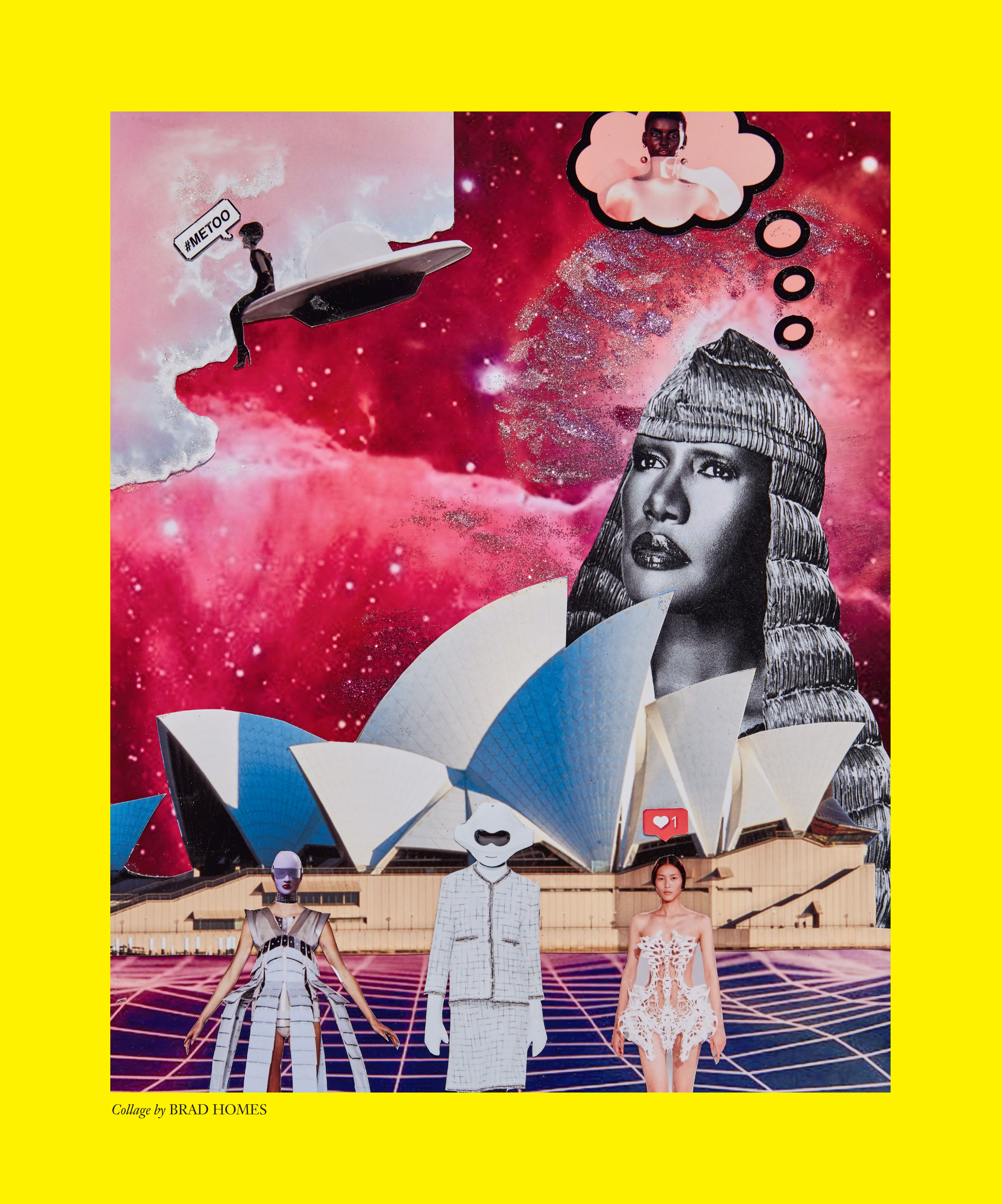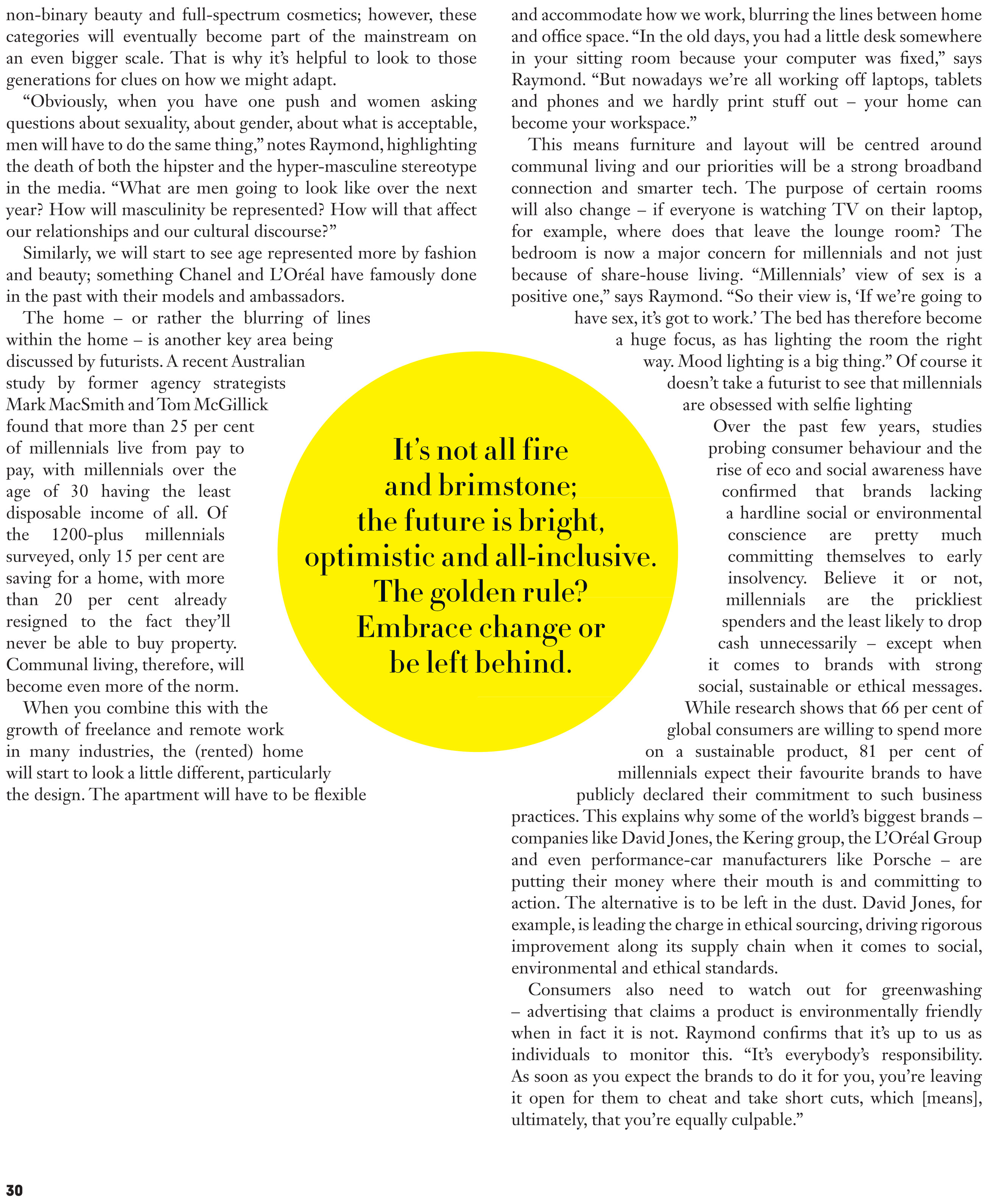




Are you future-fit? From the role of #metoo to why millennials are obsessed with their mattresses, we look at some of the biggest movements shaping the future of the world we live in.
Artificial intelligence, space tourism, synthetic biology, alternative fuel- cell vehicles, non-binary fluidity, data mining, conscious consumerism, automation and greenwashing: words once found only in sci-fi-like texts are now part of our daily lexicon. From how we communicate to the media we consume, what we share, what we buy and how we spend our time, the whys and hows of what was relevant five years ago are becoming obsolete, superseded by things that seem to require an imagination. If it feels like the world is changing at an incredibly rapid pace, that’s because it is. Spoiler alert: the future is now.
Forward-gazing is a hot topic in mainstream media; it dominates our headlines, sits at the top of our scrollable feeds and, in a world that is becoming increasingly full of questions, helps find answers. Futurists, once relegated to esoteric industries, academic institutions and business-to-business planning, are helping consumers understand what on earth it all means.
“I think because of all the things that are happening – and a lot of those things would have sat in the realms of philosophy, science, technology and speculative thought – futurists are being asked to bridge the gap between a philosophic approach and a lifestyle approach,” says Martin Raymond, co-founder of The Future Laboratory and editor-in-chief of LS:N Global, forecasting agencies specialising in exactly this. “We’re being used, I suppose, as a way to channel and respond to a lot of the media headlines about robotics, AI [artificial intelligence] or
advancements in science – which, for a lot of people, can be difficult to embrace or understand.”
Take the global reaction to the Facebook-Cambridge Analytica
data scandal as an example. The incident wasn’t particularly
surprising, it wasn’t exactly strange or different to what is happening with our data all the time – it’s just that we weren’t as aware of it. “Rather than owning it in a way that is potentially useful to all parties, we reacted against it in that tragic way that always happens when new science comes out,” says Raymond of the incident. “We challenge it, we fear it, we worry about it rather than saying, ‘If this was in the realm of medical science and they were collecting data that would help us better understand different aspects of health, wellness and illness – and we used it to nudge us towards better lifestyles – would that be a terrible thing?’” It would not.
“In which case, we understand that data has power and our job is to understand that power and to manage it accordingly – algorithms and all those things can be used to create better opportunities. I think we need to remind people that tomorrow hasn’t [already] happened, it is happening as we live today.”
It’s not all fire and brimstone; the future is bright, optimistic and all-inclusive. The golden rule? Embrace change or be left behind. “Some people refuse to take part in it, which is their choice,” says Raymond. “By refusing, you that other people will still push forward. [It’s] the same with every advancement."
The future is not just powered by batteries. Many worthy debates are taking place right now, particularly when it comes to #metoo, one of the biggest movements of the past year. The knock-on effect of this movement – for fun, let’s call it #metoo.0 – is now happening within fashion, beauty and lifestyle. It’s defining how brands are communicating to women, how women are being represented and included, and how they want to be spoken to.
The debate and awareness around diversity occupies the same space – whitewashing, gender roles, toxic masculinity, homophobia, racial profiling and the sexualisation of women by brands is achingly obvious to us these days. So, soon we’ll start to see major shifts in fashion and beauty, not only in the imagery but also in the product. For example, gen Z and millennials are already embracing gender-fluid fashion, non-binary beauty and full-spectrum cosmetics; however, these categories will eventually become part of the mainstream on an even bigger scale. That is why it’s helpful to look to those generations for clues on how we might adapt.
“Obviously, when you have one push and women asking questions about sexuality, about gender, about what is acceptable, men will have to do the same thing,” notes Raymond, highlighting the death of both the hipster and the hyper-masculine stereotype in the media. “What are men going to look like over the next year? How will masculinity be represented? How will that affect our relationships and our cultural discourse?”
Similarly, we will start to see age represented more by fashion and beauty; something Chanel and L’Oréal have famously done in the past with their models and ambassadors. The home – or rather the blurring of lines within the home – is another key area being discussed by futurists. A recent Australian study by former agency strategists Mark MacSmith and Tom McGillick found that more than 25 per cent of millennials live from pay to pay, with millennials over the age of 30 having the least disposable income of all. Of the 1200-plus millennials surveyed, only 15 per cent are saving for a home, with more than 20 per cent already resigned to the fact they’ll never be able to buy property. Communal living, therefore, will become even more of the norm. When you combine this with the growth of freelance and remote work in many industries, the (rented) home will start to look a little different, particularly the design. The apartment will have to be flexible and accommodate how we work, blurring the lines between home and office space. “In the old days, you had a little desk somewhere in your sitting room because your computer was fixed,” says Raymond. “But nowadays we’re all working off laptops, tablets and phones and we hardly print stuff out – your home can become your workspace.”
This means furniture and layout will be centred around communal living and our priorities will be a strong broadband connection and smarter tech. The purpose of certain rooms will also change – if everyone is watching TV on their laptop, for example, where does that leave the lounge room? The bedroom is now a major concern for millennials and not just because of share-house living. “Millennials’ view of sex is a positive one,” says Raymond. “So their view is, ‘If we’re going to have sex, it’s got to work.’ The bed has therefore become a huge focus, as has lighting the room the right way. Mood lighting is a big thing.”
Of course it doesn’t take a futurist to see that millennials are obsessed with selfie lighting. Over the past few years, studies probing consumer behaviour and the rise of eco and social awareness have confirmed that brands lacking a hardline social or environmental conscience are pretty much committing themselves to insolvency.
Believe it or not, millennials are the prickliest spenders and the least likely to drop cash unnecessarily – except when it comes to brands with strong social, sustainable or ethical messages. While research shows that 66 per cent of global consumers are willing to spend more on a sustainable product, 81 per cent of millennials expect their favourite brands to have publicly declared their commitment to such business practices. This explains why some of the world’s biggest brands – companies like David Jones, the Kering group, the L’Oréal Group and even performance-car manufacturers like Porsche – are putting their money where their mouth is and committing to action. The alternative is to be left in the dust. David Jones, for example, is leading the charge in ethical sourcing, driving rigorous improvement along its supply chain when it comes to social, environmental and ethical standards.
Consumers also need to watch out for greenwashing – advertising that claims a product is environmentally friendly when in fact it is not. Raymond confirms that it’s up to us as individuals to monitor this. “It’s everybody’s responsibility. As soon as you expect the brands to do it for you, you’re leaving it open for them to cheat and take short cuts, which [means], ultimately, that you’re equally culpable.”